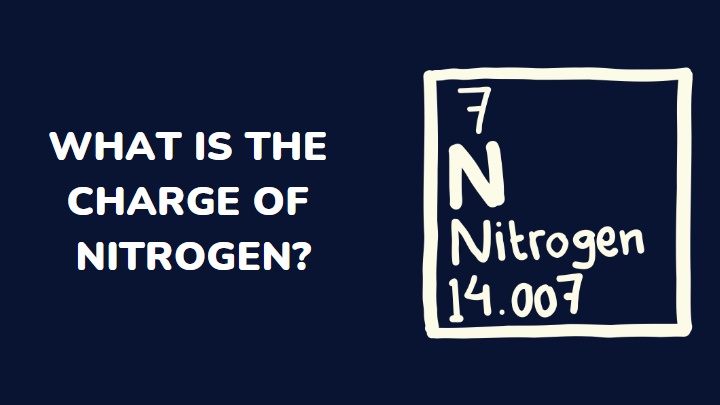Although nitrogen is sometimes used and referred to as an inert gas, it is not. Nitrogen has a charge because its outermost shell does not have the complete electrons that inert gases have.
Nitrogen has similar properties to inert gases because it has a large dissociation energy and is quite stable in ordinary atmospheres. This is why it is commonly mistaken as an inert gas.
Then, what is the charge of nitrogen? Read this article to find out this answer and many other interesting details about this atmospheric gas.
What is nitrogen?
According to the arrangement on the periodic table, nitrogen is the seventh of the one hundred and eighteen elements in existence. It is known by its symbol ‘N’ and the number ‘7’ which indicates its atomic number.
Nitrogen is a nonmetal and a member of group 5A or VA or 15. It has an atomic mass of 14.0067 and an electronic configuration of [He] 2s22p3. Nitrogen is an odorless and colorless nonflammable gas that makes up 79% of the atmosphere, alongside other elements.
Additionally, it has a boiling point of -320.4°F (-195.8°C) and a melting point of -346°F (-210°C). Nitrogen is used in the production of compounds like amino acids, proteins, nucleic acids, fertilizers, nitric acid, dyes, nylon, and explosives.
Nitrogen also occurs naturally in organic and inorganic forms. The inorganic forms are N2 gas, nitrate, nitrite, and ammonium. The organic forms are amino acids, proteins, nucleic acids, nucleotides, and urea.
What is the charge of nitrogen?
Nitrogen has various charges, depending on which state it is in. It has a formal charge of -1 when it is an anion, +1 when it is a cation and 0 in its neutral state. As a gas (N2), N has a charge of +1.
However, as a monoatomic element, nitrogen will have a charge of -3 because it must gain three electrons to attain an octet structure and become stable.
Nitrogen has a valency of 3 and 5, which is different from the various charges. It has a valency of 5 because it has five electrons in its second shell.
It has a valency of 3 because it must gain three electrons to attain the octet structure of the nearest inert gas. With the five electrons in its outermost shell, nitrogen can bond in the outer 2p and 2s orbitals.
What is the hybridization of nitrogen?
Nitrogen has an SP3 hybridization. This implies that it has four SP3 hybrid orbitals.
These hybrid orbitals are responsible for the bonds nitrogen shares with hydrogen and carbon in N-H and C-N sigma bonds.
Two of these bonds overlap with the s-orbital in hydrogen to form the two N-H sigma bonds. In C-N sigma bonds, one of the SP3 hybridized orbitals overlaps with an SP3 hybridized orbital from carbon.
What is the charge of nitrogen in nitrogen oxide?
The charge of nitrogen in nitrogen oxide (or nitrogen monoxide, NO) is +2. The overall charge of NO is 0 because it is a neutral compound. Oxygen has a charge of -2. Mathematically, it will have a charge of +2.
What is the charge of nitrogen in nitrogen dioxide?
In nitrogen dioxide (NO2), nitrogen has a charge of +4. This is the same as its oxidation number.
What is the charge of nitrogen in a nitrite?
In nitrite ion (NO–2), nitrogen has a charge of +2.
What is the charge of nitrogen in a nitrate?
The charge of nitrogen in nitrate (NO3–) is +1.
FAQs
What is the charge of nitrogen in peptide bonds?
In a peptide bond, nitrogen has a net positive charge. However, because peptide bonds are in resonance forms, this is a formal rather than an actual charge.
Can nitrogen have a +1 charge?
Yes, it can. In a case where there are four bonds and no lone pair, it will have a formal charge of +1.
Can nitrogen have a +2 charge?
Yes, nitrogen can have a formal charge of +2 when it has three bonds and no lone pair.
Is nitrogen a cation or an anion?
Nitrogen is not a cation, nor is it an anion. Nitrogen, by itself, is a neutral atom. On the other hand, cations and anions have positive or negative charges, respectively.
Moreover, nitrogen is not a cation because all cations are metals, but nitrogen is a nonmetal. Although it is a nonmetal which should make it an anion, nitrogen does not become an anion until it gains three more electrons than protons and becomes a nitride (N3-).
Conclusion
Nitrogen, by itself, has a charge of +3. This means that it will require three more electrons in its outermost shell to attain the stability of the inert gas nearest to it.
However, when in combination with other elements, nitrogen can have different charges as seen in the article. Nitrogen is an essential part of many organic compounds needed for everyday functions.
Learn about the similarities and differences between ammonia and ammonium.
Thank you for reading.
